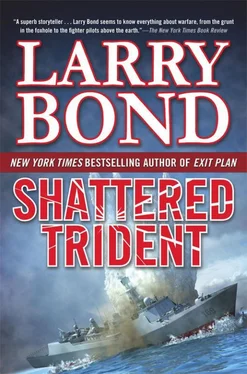Simonis finished up the overview of the patrol orders with the sortie schedule. “While the Chinese may or may not be aware there are four boats here at Guam right now, I don’t plan on making it easy for them. As far as their imagery satellites are concerned, there is only one boat here. I intend for them to see only one on their next pass. Therefore, North Dakota departs first, tonight, at 2100. Three hours later Texas will leave. Three hours after that Oklahoma City will sortie, followed by Santa Fe tomorrow afternoon.”
Dobson’s head popped up; he appeared confused. Simonis saw his reaction. “I switched yours and Halsey’s departure around, Bruce. Santa Fe has some repairs that require tender support, so she’ll leave last.” Halsey looked annoyed with the commodore’s comment.
“Okay, people, that about wraps this pre-patrol briefing up,” declared Simonis. “Are there any other questions? Last chance.”
“Yes, sir, I have one,” Dobson replied. “What are my rules of engagement?”
“I believe the order ‘do not get detected’ addresses that, Captain.” Simonis’s voice had an edge to it.
“Commodore, we are taking our boats into a potential war zone. I’ll do my damnedest not to be seen or heard, but in the unlikely event I’m picked up, and somebody starts shooting at me, what are my options, sir?”
Jerry wanted to hear Simonis’s answer to the question as well, as it was at the top of his list. There was an awkward silence; Simonis was visibly tight and glanced over toward Rear Admiral Burroughs. It was the admiral that finally answered.
“The situation is very precarious, Captain. We don’t want to accidentally start a war because one of our actions was misinterpreted. There are individuals who are concerned that a loosely defined ROE would increase that risk. However, a hyperconservative one doesn’t work either.”
Burroughs left his chair and walked over to the conference table. Resting his weight on the table, he leaned forward, an intense look on his face.
“If after every possible measure has been taken to avoid detection, or to break contact if detected, if there is absolutely no other way to evade a hostile unit that is firing at you, you may defend yourselves. I will trust your judgment; you’ve been vetted and trained for independent command, and I’m not about to hold your hand. But shooting back has to be the very last course of action, and only to protect your boat. Understood?”
“Absolutely, Admiral,” replied Dobson. The other three COs nodded their acknowledgment.
“Gentlemen, this concludes the briefing. Please see my operations officer, Commander Walker, in the back to get your binders wrapped for you to take back to your boats,” ordered Simonis.
Jerry shook his fellow captains’ hands and wished them good luck. While Dobson, Halsey, and Pascovich headed to the back of the conference room, Jerry walked up to Patterson. She was standing alone; Burroughs and Simonis were off to the side talking intensely about something.
“Joanna, one last question.”
“Yes, Jerry, what is it?”
“Isn’t it kind of a contradiction to say there is a high probability of war, and at the same time say there is no rational reason for said war?”
Patterson took a deep breath; she looked worn and perhaps a bit irritated. “Welcome to my world, Jerry. But yes, it’s a bit of a mystery. One that we’re hoping you can help answer.”
Joanna looked over his shoulder, making sure no one would hear her but Jerry. “We’re still working the problem, Jerry. Trust me, four submarines are not the only collection assets we are putting on this crisis. What I told you is what we know, what we don’t know, and what we think. I didn’t say it would make sense.”
Jerry caught her slight smile at the end. Chuckling, he said, “Touché. Well, when you do figure it out, don’t forget us minions in the trenches.”
“You’ll be kept informed. I’ll make sure of that.”
“Thanks, Joanna. Oh, and one thing to pass on if you think it’s appropriate. My time with the SEALs beat it into me that there better be at least a Plan B, if not a Plan C. The president needs to be thinking about what he’ll do if this doesn’t work. Because my crew will be on the firing line, dealing with the results, regardless of whether or not there is a backup plan. It would be good to know if we can expect any help.”
“I can assure you, Jerry. The president is well aware, and we are looking into contingency planning.”
“That’s all I need to hear,” replied Jerry. “Give my best to Lowell, and you’ll be hearing from me.”
“Be careful, Jerry,” Joanna croaked as she gave him another hug.
22 August 2016
Tokyo University, Waseda Campus
Hongo, Bunkyo Ward, Tokyo
It had not started well. Then it got worse.
The Littoral Alliance, which appeared to be the most popular label for the new collaboration, was supposed to be a secret from the Chinese. Therefore, Komamura had suggested having the first face-to-face meeting of the principals at his university. The University of Tokyo was one of the most prestigious schools in Asia, and its Graduate School of Economics sponsored a nonstop calendar of international seminars and conferences. The Chinese would be much less likely to notice the heads of several Asian navies in one place if they met at his school instead of a military base.
It should have been trivial for one of Todai’s most famous professors to reserve several seminar rooms. But the school had needed to know what conference the rooms were for. So Komamura had invented one, on “maritime economics,” and then had to invent a reason why information on the “conference” should not appear on the school’s Web page or in the newsletter. And he had to submit a preliminary list of attendees at least a week before the conference, and a final list within twenty-four hours of the opening session…
There seemed to be a hundred details, each requiring phone calls and e-mails. And with every interaction, he’d wondered if this was the one the Chinese would spot. Regardless of its innocence, each communication was a data point, a stone in the river. Given enough rocks, the Chinese might find a path across.
His classwork suffered. Even after unloading every duty he could on his hard-working graduate students, there were certain tasks he refused to delegate. Doctoral dissertations needed to be reviewed, lecture notes updated. It was work, but work he enjoyed because of his fascination with economics.
And then there were the frequent meetings with Admiral Kubo. Komamura looked forward to them, and he believed the chief of the maritime staff enjoyed the break from his demanding routine.
Kubo Noriaki was a small, square-faced man, legendary for the long hours he put in at his desk, and his love of sumo wrestling. The admiral always dressed in civilian clothes, which did nothing to change the air of authority that surrounded him. Sitting in a Tokyo udon restaurant, the two looked like a pair of senior executives on their lunch break. Tokyo had hundreds of such shops, and they never ate in the same one twice.
Their last meeting had not been as pleasant as most. Komamura had received word from his contacts in both India and Taiwan, on the same day, that they would not be attending his conference, even as observers. He was depressed, and it surprised him that he was so upset.
“Of course you take it personally. This alliance is your child, sensei .” Kubo insisted on addressing him using the same honorific Komamura’s students used. It could mean “teacher,” or “master,” and implied a level of professional respect that Komamura really didn’t feel worthy of right then. Kubo also insisted, because of his civilian “cover,” that Komamura simply address him as “Kubo- san.”
Читать дальше

![Никки Сикс - Героиновые дневники. Год из жизни павшей рок-звезды[The Heroin Diaries - A Year in the Life of a Shattered Rock Star]](/books/78612/nikki-siks-geroinovye-dnevniki-god-iz-zhizni-pavshej-rok-zvezdy-the-heroin-diaries-a-yea-thumb.webp)










